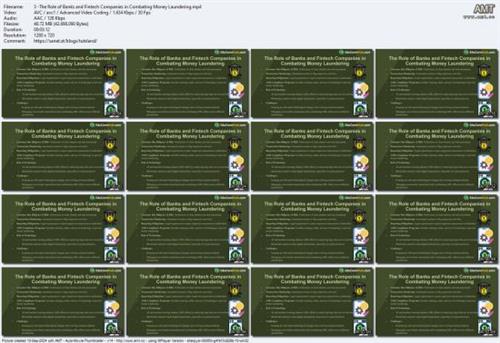- Thread Starter
- #1
Anti-Money Laundering (AML) in Banking and Fintech

Published 9/2024
MP4 | Video: h264, 1280x720 | Audio: AAC, 44.1 KHz, 2 Ch
Language: English | Duration: 41m | Size: 422 MB
Anti-Money Laundering (AML) in Banking and Fintech
What you'll learn
Overview of Money Laundering: Understand the stages of money laundering-Placement, Layering, and Integration-and its global impact.
AML Challenges in Banking and Fintech: Explore specific AML risks and how they differ between traditional banking and fintech industries.
Legal and Regulatory Framework: Gain knowledge of global AML regulations, key regulatory bodies (FATF, Basel Committee), and compliance requirements.
Industry Structure and Risks: Learn about the structure of banks and fintech companies and the risks associated with digital payment systems
AML Policies and Procedures: Develop skills to implement AML programs in banks and fintech, while addressing challenges in a globalized and digital world.
AML Compliance Teams: Understand how AML teams are structured and the roles of compliance officers.
KYC (Know Your Customer): Learn about the importance of KYC, e-KYC onboarding, and how they prevent money laundering.
Customer Screening Techniques, Transaction Monitoring
Product Risk Assessment: Learn best practices for assessing risks in banking and fintech products like wire transfers, digital wallets, and cryptocurrencies.
Customer Risk Profiles: Evaluate customer risk based on geography, business type, and transaction behavior, and apply a risk-based approach.
Identifying and Reporting Suspicious Activities: Learn how to identify red flags and the process of reporting suspicious activities to regulatory authorities.
Advanced AML Systems, AML System Implementation, Future Trends in AML
AML Training and Cybersecurity: Learn the importance of continuous AML training and the role of cybersecurity in combating money laundering.
Requirements
Basic Understanding of Financial Systems: Familiarity with banking, financial services, or fintech operations is helpful but not mandatory.
Interest in Compliance and Regulatory Practices: A genuine interest in understanding anti-money laundering (AML) practices and regulatory frameworks.
No Prior AML Knowledge Needed: The course is designed for both beginners and professionals; no prior experience in AML is required.
Description
The "Anti-Money Laundering in Banking and Fintech" course offers an in-depth exploration of anti-money laundering (AML) principles tailored specifically for the banking and fintech sectors. This comprehensive program is designed to equip professionals with the knowledge and skills needed to effectively combat financial crime and ensure compliance with regulatory requirements.Module 1 introduces the fundamentals of money laundering, covering its impact on the global financial system and the key stages: Placement, Layering, and Integration. Module 2 examines the specific AML challenges and risks faced by banks and fintech companies, highlighting the unique aspects of each sector. Module 3 provides a detailed overview of global AML regulations and the roles of key regulatory bodies such as FATF and the Basel Committee.Subsequent modules delve into the operational aspects of AML, including the development and implementation of policies and procedures (Module 5), organizational structures for effective compliance (Module 6), and the importance of Know Your Customer (KYC) processes (Module 7). Students will learn about customer screening techniques (Module 8), transaction filtering and monitoring (Module 9), and risk assessment for both products (Module 10) and customers (Module 11).Advanced topics cover the latest AML technologies (Module 13), detailed requirements for AML systems (Module 14), and emerging trends and challenges (Module 15). The course concludes with a focus on training and cybersecurity (Module 16), emphasizing the need for ongoing education and a culture of compliance.By the end of the course, participants will have a robust understanding of AML practices in the banking and fintech industries, preparing them to effectively manage and mitigate financial crime risks.
Who this course is for
Banking Professionals: Individuals working in traditional banking roles who want to enhance their understanding of AML regulations and compliance.
Fintech Employees: Professionals in fintech companies looking to grasp the complexities of AML within the digital financial landscape.
Compliance Officers: Those responsible for ensuring their organizations comply with AML regulations and want to stay up-to-date with the latest practices.
Risk and Fraud Analysts: Individuals working in risk assessment, fraud detection, and financial crime prevention.
Regulatory and Legal Experts: Professionals involved in the legal and regulatory aspects of financial services who want to deepen their AML knowledge.
Entrepreneurs and Business Owners: Founders or executives of fintech companies who need to understand AML to ensure compliance in their operations.
Homepage:

Download link
rapidgator.net:
nitroflare.com:

Published 9/2024
MP4 | Video: h264, 1280x720 | Audio: AAC, 44.1 KHz, 2 Ch
Language: English | Duration: 41m | Size: 422 MB
What you'll learn
Overview of Money Laundering: Understand the stages of money laundering-Placement, Layering, and Integration-and its global impact.
AML Challenges in Banking and Fintech: Explore specific AML risks and how they differ between traditional banking and fintech industries.
Legal and Regulatory Framework: Gain knowledge of global AML regulations, key regulatory bodies (FATF, Basel Committee), and compliance requirements.
Industry Structure and Risks: Learn about the structure of banks and fintech companies and the risks associated with digital payment systems
AML Policies and Procedures: Develop skills to implement AML programs in banks and fintech, while addressing challenges in a globalized and digital world.
AML Compliance Teams: Understand how AML teams are structured and the roles of compliance officers.
KYC (Know Your Customer): Learn about the importance of KYC, e-KYC onboarding, and how they prevent money laundering.
Customer Screening Techniques, Transaction Monitoring
Product Risk Assessment: Learn best practices for assessing risks in banking and fintech products like wire transfers, digital wallets, and cryptocurrencies.
Customer Risk Profiles: Evaluate customer risk based on geography, business type, and transaction behavior, and apply a risk-based approach.
Identifying and Reporting Suspicious Activities: Learn how to identify red flags and the process of reporting suspicious activities to regulatory authorities.
Advanced AML Systems, AML System Implementation, Future Trends in AML
AML Training and Cybersecurity: Learn the importance of continuous AML training and the role of cybersecurity in combating money laundering.
Requirements
Basic Understanding of Financial Systems: Familiarity with banking, financial services, or fintech operations is helpful but not mandatory.
Interest in Compliance and Regulatory Practices: A genuine interest in understanding anti-money laundering (AML) practices and regulatory frameworks.
No Prior AML Knowledge Needed: The course is designed for both beginners and professionals; no prior experience in AML is required.
Description
The "Anti-Money Laundering in Banking and Fintech" course offers an in-depth exploration of anti-money laundering (AML) principles tailored specifically for the banking and fintech sectors. This comprehensive program is designed to equip professionals with the knowledge and skills needed to effectively combat financial crime and ensure compliance with regulatory requirements.Module 1 introduces the fundamentals of money laundering, covering its impact on the global financial system and the key stages: Placement, Layering, and Integration. Module 2 examines the specific AML challenges and risks faced by banks and fintech companies, highlighting the unique aspects of each sector. Module 3 provides a detailed overview of global AML regulations and the roles of key regulatory bodies such as FATF and the Basel Committee.Subsequent modules delve into the operational aspects of AML, including the development and implementation of policies and procedures (Module 5), organizational structures for effective compliance (Module 6), and the importance of Know Your Customer (KYC) processes (Module 7). Students will learn about customer screening techniques (Module 8), transaction filtering and monitoring (Module 9), and risk assessment for both products (Module 10) and customers (Module 11).Advanced topics cover the latest AML technologies (Module 13), detailed requirements for AML systems (Module 14), and emerging trends and challenges (Module 15). The course concludes with a focus on training and cybersecurity (Module 16), emphasizing the need for ongoing education and a culture of compliance.By the end of the course, participants will have a robust understanding of AML practices in the banking and fintech industries, preparing them to effectively manage and mitigate financial crime risks.
Who this course is for
Banking Professionals: Individuals working in traditional banking roles who want to enhance their understanding of AML regulations and compliance.
Fintech Employees: Professionals in fintech companies looking to grasp the complexities of AML within the digital financial landscape.
Compliance Officers: Those responsible for ensuring their organizations comply with AML regulations and want to stay up-to-date with the latest practices.
Risk and Fraud Analysts: Individuals working in risk assessment, fraud detection, and financial crime prevention.
Regulatory and Legal Experts: Professionals involved in the legal and regulatory aspects of financial services who want to deepen their AML knowledge.
Entrepreneurs and Business Owners: Founders or executives of fintech companies who need to understand AML to ensure compliance in their operations.
Homepage:
Screenshots

Download link
rapidgator.net:
You must reply in thread to view hidden text.
nitroflare.com:
You must reply in thread to view hidden text.
